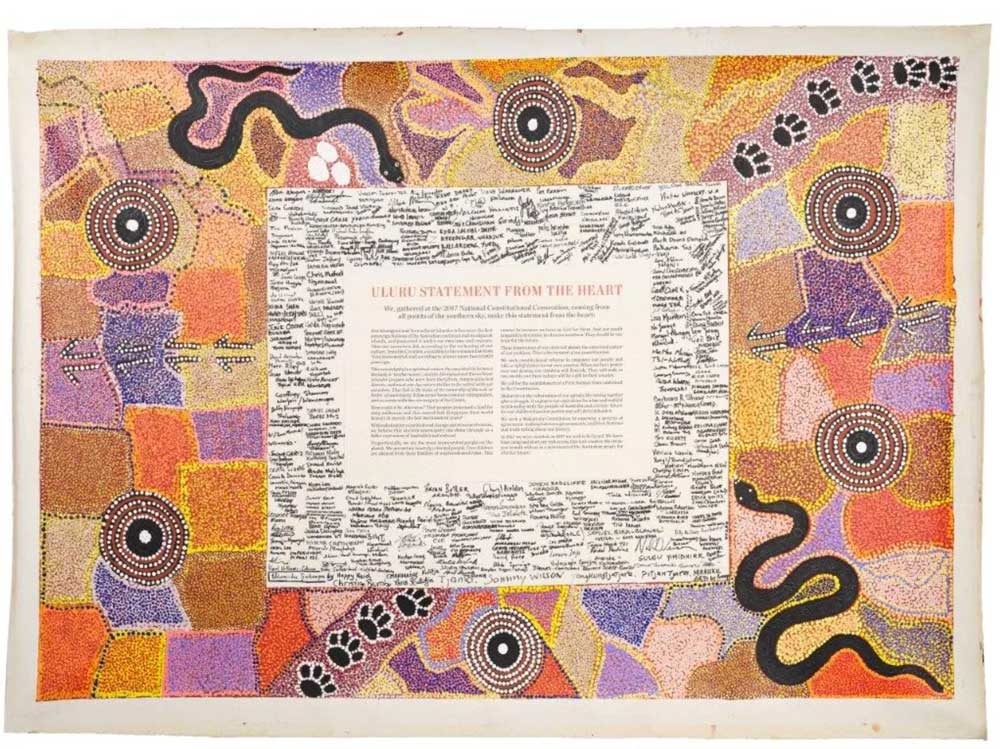The ‘powerful and historic’ Uluru Statement from the Heart has been awarded the Sydney Peace Prize
The Uluru Statement from the Heart has been recognised for its “clear and comprehensive agenda for healing and peace”, as advocates call for government action on a referendum.
The Uluru Statement from the Heart has been awarded the Sydney Peace Prize, four years after it was delivered to the Australian people.
The landmark statement – an agreement of 250 Indigenous delegates that calls for a constitutionally-enshrined Indigenous Voice to Parliament – was issued to Australians on 26 May, 2017.
The prize was revealed on Wednesday, with the jury saying the statement brought “together Australia’s First Nations Peoples around a clear and comprehensive agenda for healing and peace within our nation”.
“The Uluru Statement from the Heart is a powerful and historic offering of peace,” Sydney Peace Foundation chair, Archie Law, said in a media release.
The Uluru statement provides a roadmap for recognising First Nations in Australia’s constitution, proposing structural reform on three fronts: Voice, Treaty and Truth.
University of New South Wales Professor of Law and Cobble Cobble woman Megan Davis, who worked with Pat Anderson and Noel Pearson to help deliver the statement, said the prize was tribute “to the men and women of the dialogues who crafted a roadmap to peace for the nation”.
“The Uluru Statement was the culmination of a dialogue process designed to take agreement and disagreement and elicit a pathway forward on the vital question of recognition,” she said in a UNSW media release.
Professor Davis, Ms Anderson and Mr Pearson were to acknowledge the announcement in a ceremony on Wednesday before formally receiving the prize – Australia’s only international prize for peace – at a formal event later in the year.
Ms Anderson, an Alyawarre woman and chair of the Lowitja Institute, said the statement was “an invitation to the Australian people to walk with us First Nations people to compel the politicians we elect to seek change and not be afraid of change”.
Guugu Yimidhirr man Mr Pearson said that while Australia’s First Nations peoples remained unrecognised, the country was “missing its most vital heart”.
“The Uluru Statement was the answer to the Commonwealth’s desire to recognise First Nations in the Constitution,” Mr Pearson said in the UNSW release.
“The evidence four years later is overwhelmingly that Australians will support giving us a Voice. It’s time.”

‘We cannot lose this opportunity’
Advocates have called for action as they marked the statement’s fourth anniversary, which also coincides with National Sorry Day, saying the campaign for a constitutionally-enshrined Voice to Parliament was “stronger than ever”.
The government has been consulting on proposals for the design of a Voice as part of a co-design process. The From the Heart campaign on Wednesday said that as consultations draw to a close and a final report is prepared, the government should outline a pathway forward for a referendum on the matter.
“With over 80 per cent of public submissions to the co-design consultation process supporting a constitutionally-enshrined Voice, the Australian people are saying it is now time to put the Voice to a referendum,” From the Heart director Dean Parkin said in a statement.
He said that if a Voice was simply legislated rather than constitutionally protected, it would be “another example of decision-makers dismissing the people and imposing a top-down solution that nobody wants”.
Professor Davis also said that Australians “should be given the chance to change the nation through a referendum”.
In another UNSW article on Wednesday, she said a legislated Voice to Parliament would be “beholden to the whim of the government”.
She said there was “too much at stake for anything less” than a constitutionally-protected Voice “that empowers Aboriginal and Torres Strait Islander people to have a say in the laws and policies that impact our lives”.
“It’s their voices that need to be heard, empowered and protected. We cannot lose this opportunity for enduring and meaningful change that will impact the lives of Aboriginal and Torres Strait Islander peoples across the country,” Professor Davis said.
SBS News has contacted Minister for Indigenous Australians Ken Wyatt for comment.
He has previously stressed that the framework for a Voice would ensure Indigenous voices were heard even if it was done through legislation.
The government promised a referendum on constitutional recognition back in 2019. Mr Wyatt has since said this is unlikely to take place this parliamentary term, saying “constitutional recognition is too important [to] rush and too important to fail”.

